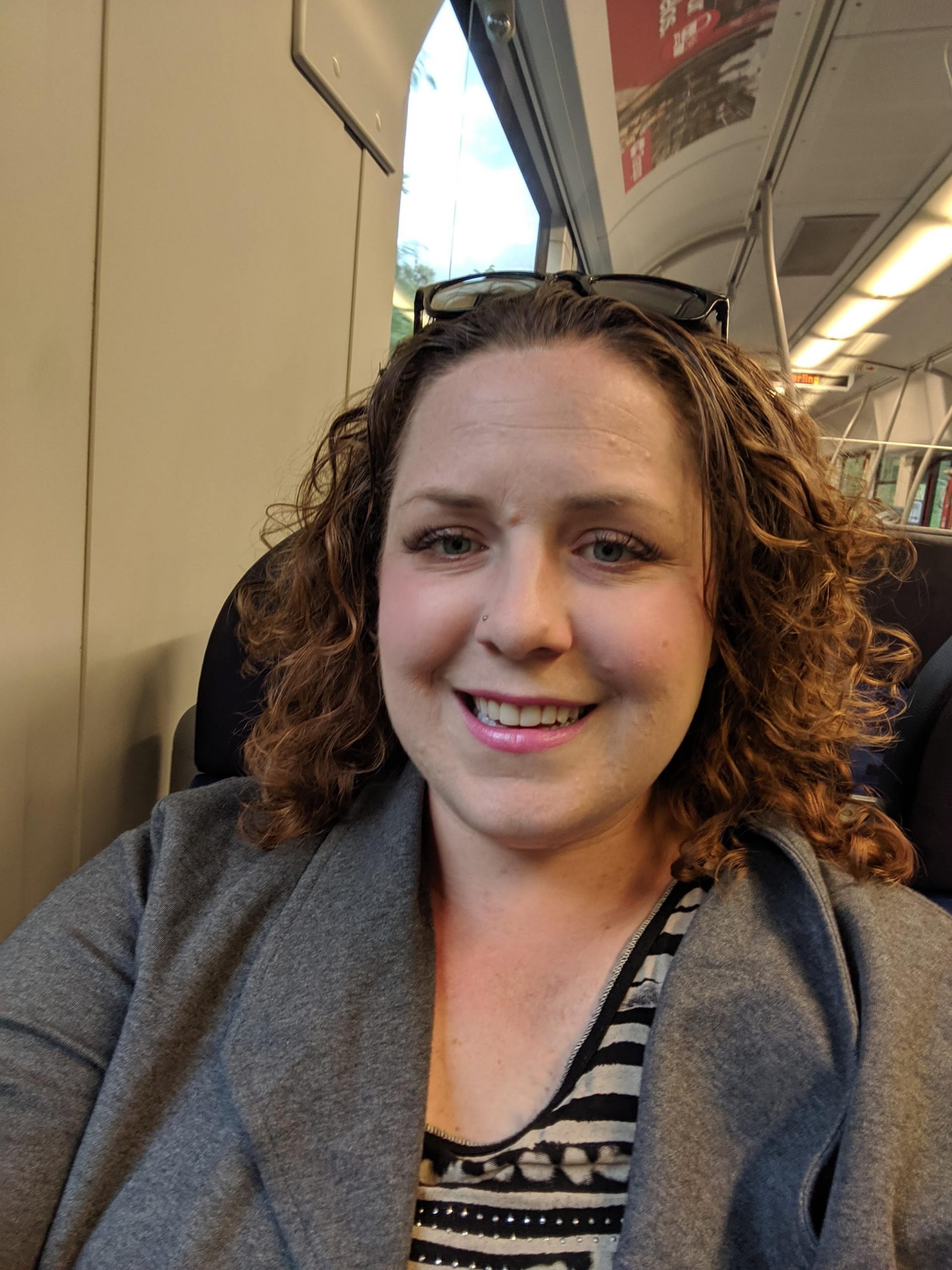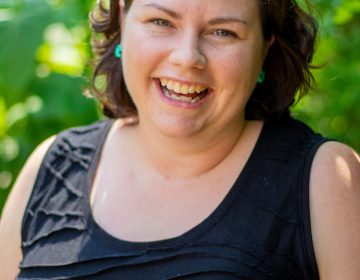
Valérie Laframboise
A little bit about you:
Name: Valérie Laframboise
Age: 34
City: Ottawa, ON
What was your diagnosis? Breast cancer
What year was it? What was your age at the time?
I was diagnosed on November 26, 2015 at the age of 30.
What is something you’ve done that you’re really proud of?
During the summer of 2016, while going through my chemotherapy, I co-instructed the Breast Cancer Survivor Clinic at a local Running Room — a 10-week program to help women run/walk the CIBC Run for the Cure.
What is a top item on your life to do list?
Skydive and fly in a hot air balloon.
What are your hobbies?
Running, reading, spending time with friends.
Your diagnosis:
What was your life like before your diagnosis?
I had a pretty active lifestyle was running three or four times a week and I had just started to train for a half marathon. I was working full-time at the University of Ottawa.
How did you find out you were sick? What led to your diagnosis?
In August 2015, I felt a lump on my left breast while in the shower. I mentioned it to a few friends who said it could be a cyst, but to keep checking it. Week after week, it was still there, and it wasn’t really going away. I started looking stuff up on Google about breast cancer (bad idea).
At the end of October, I had my yearly pap exam with my gynecologist. She started asking her routine questions. When she asked if breast cancer was in my family, I started to cry. I told her no, but I found a lump in my breast. She then proceeded to do a breast exam and told me not to worry about it, it was just fibrocystic breast.
I told her that I would like a mammogram and have it checked it as the lump didn’t seem normal to me. She informed me that my breasts are too dense for a mammogram. I insisted to have it checked, she agreed to refer me for an ultrasound and that she would get the results.
One week later, at 6:30 a.m., I’m at the imaging clinic for my ultrasound. I knew something wasn’t right just by the facial expression of the technician. She left the room, came back with someone else, and told me I would need a mammogram. I told her that I was told that I was too young for mammogram!
A few minutes later I was called in for my mammogram (gulp!). The technician told me the more she can squeeze, the better the picture will be. Ouch! After taking pictures of both breast, I was told I could get dressed, but must wait. The same technician took me through a maze in a back room and informed me that I will need to go for a biopsy. This is where it hit me — I was bawling my eyes out!
She led me to a secret door in the back that brought me directly to the parking lot.
I wasn’t expecting this kind of information at this appointment, so I went alone. I immediately called my mother and my sister. Crying on the phone. I couldn’t believe what was happening.
I had my appointment at the hospital for my biopsy one week later — man, was that ever painful! I asked the radiologist if he had any idea into what it could be, knowing that he couldn’t really say much. He asked if I had a surgeon lined up.
Less than two weeks later, I got a phone call from the breast health clinic in Gatineau (where I lived then) to book an appointment with a surgeon! I asked the lady what was the appointment for as I was still waiting for the results from my biopsy. She told me she would call me back.
It turned out she messed up and wasn’t supposed to call me.
Two days later, the office of my gynecologist called me to come in the next day. My sister came to my appointment, and my gynecologist confirmed that I had ductal carcinoma in situ. (What? Was that cancer?)
What were your first thoughts when diagnosed?
“Am I going to die? Why me? I just turned 30, how can this be?” I cried a lot. Even though I had a feeling that it was cancer, I was still in disbelief.
In which hospital were you treated?
I was treated at the Gatineau Hospital.
What did your treatment consist of?
The initial treatment consisted of a lumpectomy and radiation. During my first surgery, the doctor performed a lumpectomy and removed the sentinel lymph nodes for evaluation. At my follow up appointment, my surgeon informed me that three out of four of my lymph nodes were cancerous and that the tumour margins weren’t clear, meaning a second surgery.
During that surgery, I had a axillary dissection (removing all lymph nodes on the left side). My surgeon also removed more of the area where the tumour was. Fortunately, by doing so and sending it to pathology, another tumour was discovered hiding near my armpit. This tumour was never seen with the ultrasound or the mammogram. Time for a third surgery. This time, it would be a mastectomy.
Following this third surgery, I was told the cancer has all been removed! (Third time’s a charm!)
Following my third surgery, I had eight rounds of chemo knows as Dose-Dense. I was told my cancer was aggressive and needed to be treated aggressively which includes four AC and four Taxol every two weeks.
During chemo, I had good days and bad days. Lots of fatigue, low energy. During chemo, I had to administer an injection of a drug called Neupogen to myself for seven days post-treatment. This would help produce white cells since my immune system was so low. The Neupogen mixed with the Taxol gave me excruciating leg pain. It was so painful to walk, stand up, sit down — everything! My oncologist suggested Gatorade, which oddly helped near the end.
I had 25 sessions of radiation to finish it all. This meant going to the hospital every day from Monday to Friday for five weeks. Luckily my appointments were at 8:30 a.m. and I was able to sleep the rest of the day
Since my cancer is hormonal positive, I must take medication for 5-10 years to help prevent the cancer from coming back. Since September 2016, I am taking Tamoxifen (a pill that blocks the effects of the estrogen hormone in the body and is taken every day). Each 28 days I must go to my doctor’s office to get an injection of Zoladex (an ovarian suppression). I’ve recently changed the dose for the Zoladex to receive a bigger dose every three months instead.
Life after cancer:
How is life different for you now post-diagnosis?
It’s very different living as a uni-boob! I’m always making sure I have my prosthesis on the correct side and making sure it’s correctly placed. I can’t wear v-necks or nice dresses anymore.
Every time I have new pain or a cough that persists, the fear of recurrence or metastasis is always with me.
Emotionally, it’s hard. The life as a uni-boober sucks. Dating after cancer sucks; don’t even get me started.
Socially, cancer has shown me which friends I can count on during rough times!
What was the toughest part about having cancer as a young adult?
Not having anyone to relate to until I found YACC. Having to deal with the fear of infertility at such a young age, going through medically induced menopause at the age of 31. Missing out on job opportunities at work. Seeing all my friends getting married/have kids while I am losing my hair and having hot flashes! Financial stress added on top of everything; bills keep on coming even though my income is lower on long-term disability.
What kept you/keeps you busy during treatment?
Netflix, and lots of it! I also spend a lot of time with my family and being surrounded with kids (cousins’ kids and my niece).
How are you connected with Young Adult Cancer Canada? How did it happen?
My first event was a Localife event back in summer 2016. We went to Absolute Comedy and to a pub. The next event that got me hooked was the Big Cancer Hook-Up in 2017. Since then, I’ve attended many Localife events, Survivor Conference 2017, and Retreat Yourself BC 2018. I’ve been a Localife leader in Ottawa since September 2018. I love being able to give back and getting the word out about YACC.
The issues:
Did anyone talk to you about fertility options before treatment? If so, how did that affect your decisions? If not, what do you wish you had known?
Yes, I went to talk with a fertility specialist and the process was explained. I decided not to go through with egg preservation as I would have to take hormones and my cancer was hormonal positive.
Resources and recommendations:
Have you participated in any other retreats, conferences, programs, or support groups you’d like your cancer peers to know about?
- Stretch Heal and Grow: A retreat for young women facing breast cancer.
- Rethink Young Women Network: An online support group for young women with breast cancer.
Stay in touch:
What would you like to say to other young adults dealing with cancer who are reading this profile?
- #YODO (you only die once), so live your life every day!
- “If you hate that it happened, you hate that you are.”
- “Just live your best life!”
Are you interested in helping others facing cancer challenges? If so please let us know how you can be contacted. Absolutely!
Blog: http://valeriebreastcancer.blogspot.ca/
[Editor’s note: If you would like to get in touch with Val, email [email protected] and we’ll forward your message to her.]











